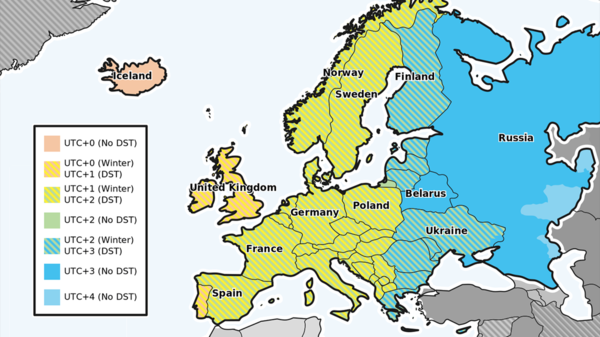Europe Ends DST—Possibly for Last Time
In what could be Europe's last coordinated time change from Daylight Saving Time (DST) to standard time, clocks in many European countries will be turned back by one hour in October.


Areas in Europe with and without DST.
©timeanddate.com
When Do Clocks Change in Europe?
Clocks in most European countries are turned back by 1 hour on October 28, 2018 at 01:00 UTC. Since Europe spans several time zones, the switch occurs at different local times (see table below).
The US ends DST on November 4, 2018, always a week after Europe.
EU Might End DST Permanently
Next year may be the last time Europeans set their clocks forward 1 hour, as the EU considers scrapping DST permanently in 2019. The European Commission, the executive arm of the European Union (EU), has recently pushed to end the yearly clock changes in Europe.
If the initiative is successful, the last EU-wide DST period will start on Sunday, March 31, 2019. Each member state would then have the chance to decide if they stay on “summer time” (DST) year-round or change their clocks once more on Sunday, October 27, 2019 to observe permanent standard time in subsequent years. In that case, the upcoming time change would be the last joint switch from DST to standard time in Europe.
For this reason, all subsequent clock changes in European countries are now marked as preliminary on timeanddate.com.
Time Change in Europe
Most European countries synchronize their clock changes. According to the current EU rules, DST starts on the last Sunday of March and ends on the last Sunday of October. Participating countries are:
- The European Union (EU), including the United Kingdom, France, Germany, Spain, Italy, Poland, and Bulgaria.
- Most other European countries, including Norway, and Switzerland.
Upcoming DST changes worldwide
No DST in Russia
Russia does not use DST. Other European countries that don't use DST include Iceland, Belarus, Georgia, and Armenia.
DST End: European Local Times
| Time Zone during DST | Local Time of DST End | Time Zone after DST (standard time) |
|---|---|---|
British Summer Time (BST) used in UK and Ireland during summer UTC offset: +1 hour |
DST ends at 02:00 (2 am) local time. |
UTC offset: None |
Western European Summer Time (WEST) observed in Portugal, the Faroe Islands, and the Canary Islands. UTC offset: +1 hour |
DST ends at 02:00 (2 am) local time. Clocks are set back 1 hour to 01:00 (1 am). |
UTC offset: None |
Central European Summer Time (CEST), used in countries including France, Germany, Austria, Italy, Switzerland, Norway, Poland, Hungary, and Spain. UTC offset: +2 hours |
DST ends at 03:00 (3 am) local time when clocks are set back 1 hour to 02:00 (2 am). |
UTC offset: +1 hour |
Eastern European Summer Time (EEST), observed in countries including Bulgaria, Estonia, Finland, Greece, Latvia, Romania, and most areas in Ukraine. UTC offset: +3 hours |
DST ends at 04:00 (4 am) local time when clocks are set back 1 hour to 03:00 (3 am). |
UTC offset: +2 hours |
Most of the western parts of Russia and some parts of Ukraine are in the Moscow time zone, Moscow Standard Time (MSK). UTC offset: UTC +3 hours |